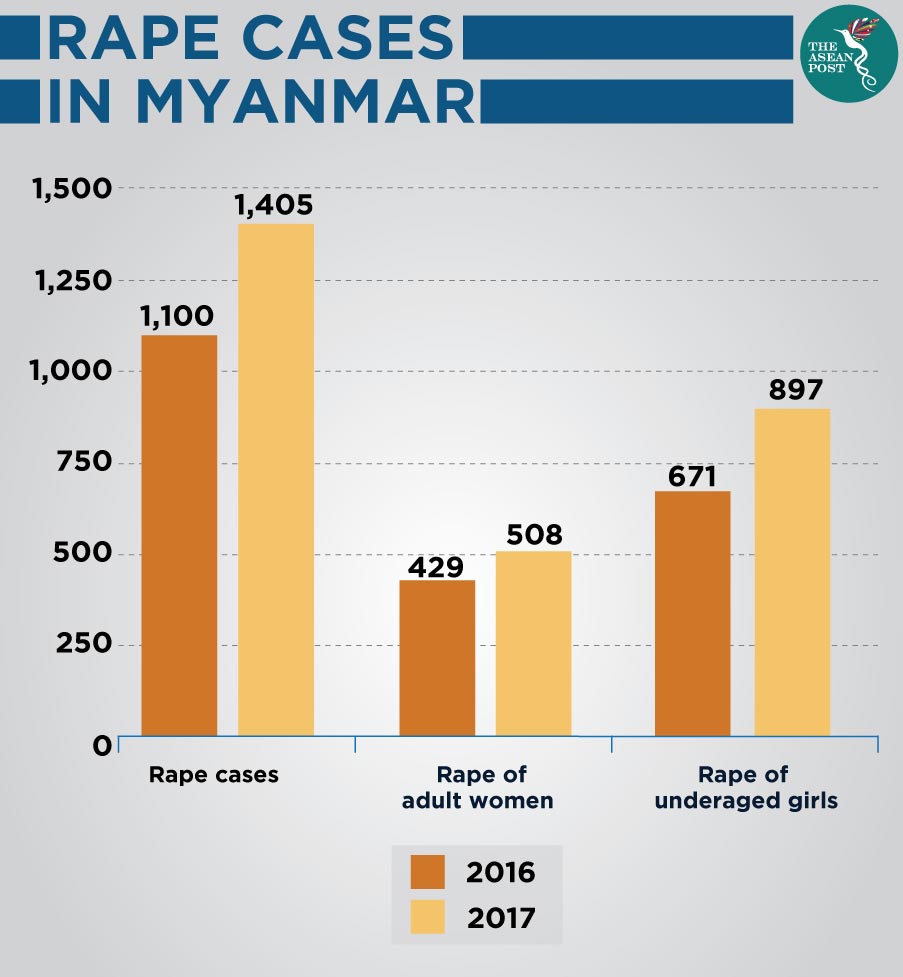Only a few months ago, Myanmar was shocked with news of the rape of a three-year-old girl who has since been given the pseudonym “Victoria”. Victoria was raped at a private nursery home in May. Then in September, she was able to testify through a video conference and identify her rapist.
“When the court showed the girl the picture of the suspects, she was able to point out the individual on the presented picture, and she was so angry seeing these pictures that she stomped angrily at them with her heel,” Victoria’s lawyer was quoted as saying.
News of the rape sparked outrage throughout Myanmar and brought attention to the rising number of rape cases in the country.
In February 2018, Myanmar’s Ministry of Home Affairs released its previous year’s statistics on rape cases. The ministry reported that rape cases rose from 1,100 in 2016 to 1,405 in 2017, which includes a rise in rapes of adult women from 429 to 508 and rapes of underage girls from 671 to 897.
But more than that, the unfortunate tragedy that befell Victoria also helped to highlight the lack of knowledge regarding sex in Myanmar, as well as the urgent need to stop viewing sex education as a taboo topic but as a necessity.
Hla Hla Win, a former English teacher who founded Myanmar-based 360ed, a social enterprise that seeks to revamp education with technology, was recently quoted as saying that the case was “obvious evidence” that the country needed to seriously think of allowing its citizens to be exposed to the right kind of sex education.
More education
“It broke the hearts of so many parents but it was also a wake-up call that we can no longer see sex education as a taboo,” said Hla Hla Win.
“As a mother and a teacher, I’m keen on this topic because many teenagers are curious about it but we don’t have a tool to teach them. A lot of teenagers in Myanmar thought pregnancy could just happen from sharing the same glass of water with the opposite sex.”

In November last year, a study conducted by Columbia University found that undergraduate women who took sex education classes before college were half as likely to be sexually assaulted in college compared to undergraduate students who received abstinence-only education and saw no reduction in rates of assault. Abstinence-only sex education discourages sex outside of marriage rather than educating students about sexual safety prior to marriage.
In August last year, family therapist and researcher at Dalhousie University, Michael Ungar, wrote an article for Psychology Today in which he said that children need to know the realities of what consent really means, the truth about oral sex and its consequences, the dangers of Internet porn (and how they can be exploited), how paedophiles groom young people for sexual assault, and much more about same-sex relationships.
“When it comes to sex and children, the more the kids know about their bodies and about the pleasures and dangers that come with sex, the safer and happier they will be,” he wrote.
Using tech
Last month, the World Economic Forum (WEF) named Hla Hla Win as one of 40 social entrepreneurs of the year. This was in recognition of her work in transforming the way hundreds of thousands of students learn in Myanmar. Key to her work is the use of augmented reality (AR).
In Myanmar, 360ed uses AR in a series of apps it has developed since 2016 to help students better visualise complex subjects such as chemistry and biology. Her project on sex education, named “Bay Kin” or “Danger Free”, was launched in August soon after the Veronica case.
The product includes a series of sex education books - in both paper and AR formats - as well as comics and games, that teach students about everything from sex organs to pregnancy. So far about 100 schools have partnered with 360ed to use its sex education books; now it is working with teachers to roll out the AR technology.
“We’re in the early stage because many teachers still feel embarrassed to teach sex in schools but AR is fun, so we hope it can help to overcome this,” she said.
Whether it’s through AR or more traditional methods, one thing that seems for certain is that it could do Myanmar a lot of good to incorporate sex education into the daily lives of its children.
Related articles:
